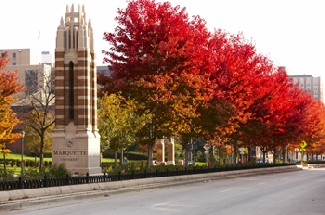
Interview:
Ka Yong Lim, from Malaysia, a senior studying political science and philosophy at Marquette University in Wisconsin.
Why did you decide to study in the U.S.A.?
I felt that the academic curriculum at my high school in Malaysia lacked emphasis on humanities and liberal arts subjects. I personally enjoy delving into the stories and details of the culture and history of civilizations around the world.
Also, I like the system here in the States. It has provided me with opportunties to extend learning beyond mere textbooks. A professor may take his or her environmental engineering class outside into the environments that they are discussing.
Why did you choose this university?
I chanced upon Marquette University (MU) after going to a U.S. education fair with my parents. We had the chance to speak to Ellen from the Office of International Education, as well as MU alumni from my country.
MU was an ideal choice, especially for the size of its population. I did not want to be awash in a sea of students and never have the opportunity to develop solid relationships with my professors.
Although the idea of living in Wisconsin did not cross my mind at that point, my parents were reassured by the famous Midwestern warmth and hospitality.
What do you like best?
I must say the dedication and support my professors have given me. They have continuously motivated and inspired me in my pursuit of exploring, discovering and learning what life has to offer.
What do you miss most?
My family! And the food -Malaysia is home to a variety of delectable cuisines
What was your biggest surprise?
Although I was advised to speak up during lectures in class, it took me a while before I got used to it. Most times I am still wary of crossing the boundaries of respect or courtesy of the instructors, although my friends have told me not to worry about such things.
...your biggest disappointment?
In the U.S. it is often necessary to have a car to drive around — to buy groceries, or to go to a restaurant on the weekend.
How have you handled:
...language differences?
This wasn’t so much of a problem as I spoke English at home. But I still get a bit tongue-tied when speaking up in class.
...adjusting to a different educational system?
Instead of a single major exam, a student’s performance in class is graded throughout the term based on various criteria, which may include quizzes, in-class and online discussions, group projects, research papers, personal journals, etc. I feel a bit more compelled to be consistent in my work throughout the term, rather than cramming everything at the last minute.
What are your activities?
I am presently a part of the Philosophy Club and the Malaysian Student Association. As a member of these societies, I participate in the annual Al and Brigg’s Run for the Children’s Hospital, Milwaukee’s city-wide Hunger Clean-up, as well as the occasional bake-sale and fundraisers.
I’ve had the opportunity to participate and represent Malaysia in International Day every spring term. We usually set up informational booths and have a food fest!
How easy or difficult is making friends?
It was quite a challenge in the beginning; making friends required you to take the initiative and speak up. But I’ve learnt over time that if I’m willing to make the first effort and say ‘hello,’ people usually respond very graciously.
How relevant is your U.S. education to your personal goals and to the needs of your country?
Since being here, I’m contemplating on the very real idea of being a university lecturer in the area of political philosophy
.
The underemphasis of the humanities and liberal arts in Malaysian education is an issue that remains close to my heart, and I believe teaching is within my best means to practically and directly address the issue.
What is your advice to other students who are considering a U.S. education?
Ask around for stories of students who have ventured to the U.S. These conversations may help resolve any qualms you may have about adjusting to a different culture, different climate and different measurement systems.
A U.S. education is more than just a process of attaining your degree; it will open doors and allow you to see the world from a very different perspective. You are embarking on an adventure that will transform you as an individual, and mark your entry as a member of the community and global society. So, carpe diem and make the most out of it!
























